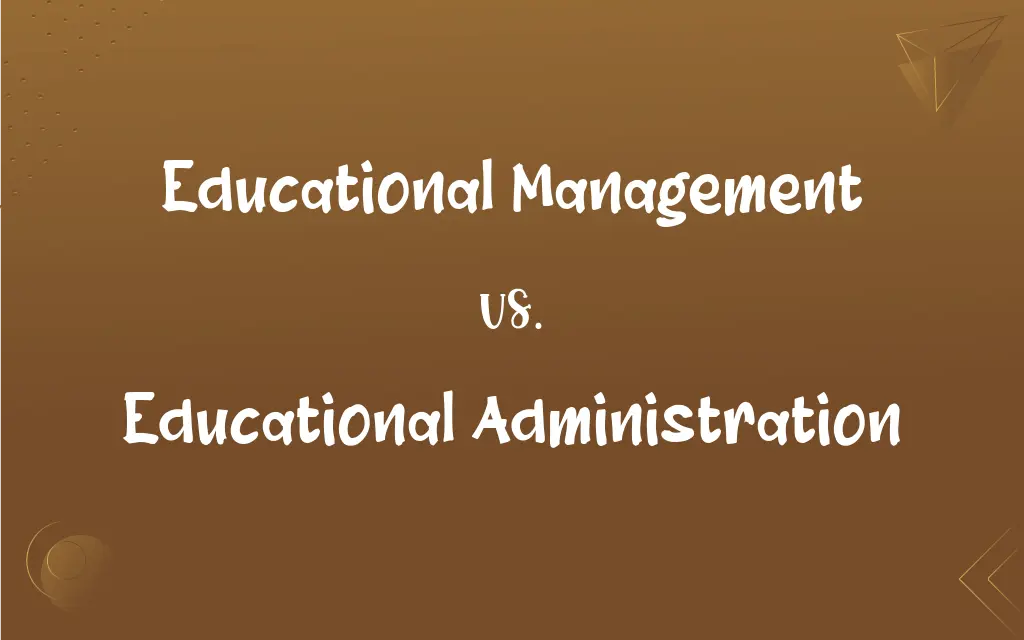Educational Management vs. Educational Administration: What's the Difference?
Edited by Aimie Carlson || By Harlon Moss || Published on January 30, 2024
Educational management involves the strategic planning and running of educational systems, focusing on policy and objectives. Educational administration is more about overseeing day-to-day operations, implementing policies, and managing staff.

Key Differences
Educational management is concerned with setting educational goals, developing strategies, and allocating resources effectively. In contrast, educational administration focuses on implementing these strategies, managing daily activities, and ensuring smooth institutional functioning.
The role of educational management is to innovate and guide the educational system towards achieving long-term objectives, emphasizing strategic planning. Meanwhile, educational administration is responsible for the practical aspects of managing educational institutions, like staffing, budgeting, and maintenance.
Educational management plays a key role in policy formulation and decision-making at a higher level, shaping the educational landscape. On the other hand, educational administration is involved in the execution of these policies within schools, colleges, and universities.
In educational management, emphasis is placed on leadership, change management, and the overall improvement of educational standards. Conversely, educational administration often deals with regulatory compliance, daily operations, and administrative tasks.
Educational management often requires a broader perspective, considering societal needs and future trends in education. Educational administration, however, is more immediate and operational, focusing on the current functioning of educational institutions.
ADVERTISEMENT
Comparison Chart
Focus
Strategic planning and policy-making
Day-to-day operations and policy implementation
Main Responsibilities
Setting goals, resource allocation, innovation
Staff management, budgeting, facility maintenance
Level of Operation
Higher-level, systemic
Institutional, practical
Key Elements
Leadership, change management, improvement of standards
Regulatory compliance, administrative tasks
Perspective and Timeframe
Long-term, considering future trends
Immediate, focusing on current institutional needs
ADVERTISEMENT
Educational Management and Educational Administration Definitions
Educational Management
Strategic planning and direction of educational systems and policies.
The educational management team worked on integrating new technology into the curriculum.
Educational Administration
Overseeing the smooth functioning of educational institutions.
Effective educational administration is key to running a successful school.
Educational Management
Coordination of resources and policies to meet educational objectives.
Educational management ensures optimal use of resources for educational excellence.
Educational Administration
Managing daily operations in schools and universities.
The educational administration is responsible for scheduling classes and maintaining facilities.
Educational Management
The process of setting and achieving long-term educational goals.
Educational management involves developing innovative teaching methods.
Educational Administration
Day-to-day management of educational systems and resources.
Educational administration plays a critical role in student and staff welfare.
Educational Management
Leadership and decision-making in the educational sector.
Effective educational management is crucial for school improvement.
Educational Administration
Handling of staffing, budgeting, and maintenance in education.
Educational administration involves hiring qualified teachers and managing the school budget.
Educational Management
Overseeing the overall development and progress of educational institutions.
Educational management focuses on enhancing student learning experiences.
Educational Administration
Implementation of policies and regulations in educational settings.
Educational administration ensures compliance with educational standards and laws.
FAQs
What roles does educational administration play?
It involves overseeing daily operations, implementing policies, and managing staff and facilities.
What are the responsibilities of educational administration?
They include managing budgets, staffing, compliance with regulations, and maintaining facilities.
Does educational administration involve interaction with students?
Yes, it often includes managing student-related services and issues.
What skills are essential for educational administration?
Skills like organizational management, leadership, and communication are crucial.
How does educational management interact with government policies?
It often involves interpreting and integrating government educational policies into systems.
What is the main focus of educational management?
It focuses on strategic planning, policy-making, and setting educational objectives.
Who typically works in educational management?
Professionals in educational management are often senior educators or policymakers.
How does educational management impact education?
It shapes the educational landscape through innovative strategies and long-term planning.
Can educational management influence curriculum development?
Yes, it plays a key role in curriculum innovation and development.
Is budgeting part of educational administration?
Yes, budget management is a key component of educational administration.
Do educational management roles require educational background?
Yes, a background in education and strategic planning is often necessary.
How does educational management address societal changes?
It adapts strategies and policies to align with evolving societal and educational needs.
How often do educational administration policies change?
Changes can occur frequently, depending on regulatory and institutional needs.
Does educational management involve research?
Yes, research is often conducted to inform policy and strategy development.
How do educational management and administration collaborate?
They work together to ensure that strategic goals are effectively implemented at the operational level.
What challenges does educational administration face?
Challenges include resource constraints, regulatory compliance, and managing diverse needs.
Can individuals in educational administration influence management decisions?
Yes, their insights and experiences can inform higher-level management decisions.
Can educational administration affect school culture?
Yes, it plays a significant role in shaping and maintaining school culture.
What is a key difference between educational management and administration?
Educational management is more strategic, while administration is more operational.
Are there specific qualifications for educational management?
Typically, positions require advanced degrees in education or related fields.
About Author
Written by
Harlon MossHarlon is a seasoned quality moderator and accomplished content writer for Difference Wiki. An alumnus of the prestigious University of California, he earned his degree in Computer Science. Leveraging his academic background, Harlon brings a meticulous and informed perspective to his work, ensuring content accuracy and excellence.
Edited by
Aimie CarlsonAimie Carlson, holding a master's degree in English literature, is a fervent English language enthusiast. She lends her writing talents to Difference Wiki, a prominent website that specializes in comparisons, offering readers insightful analyses that both captivate and inform.







































































